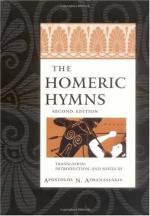“These nymphs will keep my child with them and rear him; and him when first he enters on lovely youth shall these Goddesses bring hither to thee, and show thee. But to thee, that I may tell thee all my mind, will I come in the fifth year bringing my son. At the sight of him thou wilt be glad when thou beholdest him with thine eyes, for he will be divinely fair, and thou wilt lead him straightway to windy Ilios. But if any mortal man asketh of thee what mother bare this thy dear son, be mindful to answer him as I command: say that he is thy son by one of the flower-faced nymphs who dwell in this forest-clad mountain, but if in thy folly thou speakest out, and boastest to have been the lover of fair-garlanded Cytherea, then Zeus in his wrath will smite thee with the smouldering thunderbolt. Now all is told to thee: do thou be wise, and keep thy counsel, and speak not my name, but revere the wrath of the Gods.”
So spake she, and soared up into the windy heaven.
Goddess, Queen of well-stablished Cyprus, having given thee honour due, I shall pass on to another hymn.
IV. HYMN TO DEMETER
[Syracusan medallion by Euainetos. Obv. Head of Persephone. Rev. Victorious Chariot: lang183.jpg]
Of fair-tressed Demeter, Demeter holy Goddess, I begin to sing: of her and her slim-ankled daughter whom Hades snatched away, the gift of wide-beholding Zeus, but Demeter knew it not, she that bears the Seasons, the giver of goodly crops. For her daughter was playing with the deep-bosomed maidens of Oceanus, and was gathering flowers—roses, and crocuses, and fair violets in the soft meadow, and lilies, and hyacinths, and the narcissus which the earth brought forth as a snare to the fair-faced maiden, by the counsel of Zeus and to pleasure the Lord with many guests. Wondrously bloomed the flower, a marvel for all to see, whether deathless gods or deathly men. From its root grew forth a hundred blossoms, and with its fragrant odour the wide heaven above and the whole earth laughed, and the salt wave of the sea. Then the maiden marvelled, and stretched forth both her hands to seize the fair plaything, but the wide-wayed earth gaped in the Nysian plain, and up rushed the Prince, the host of many guests, the many-named son of Cronos, with his immortal horses. Maugre her will he seized her, and drave her off weeping in his golden chariot, but she shrilled aloud, calling on Father Cronides, the highest of gods and the best.
But no immortal god or deathly man heard the voice of her, . . . save the daughter of Persaeus, Hecate of the shining head-tire, as she was thinking delicate thoughts, who heard the cry from her cave [and Prince Helios, the glorious son of Hyperion], the maiden calling on Father Cronides. But he far off sat apart from the gods in his temple haunted by prayers, receiving goodly victims from mortal men. By the design




